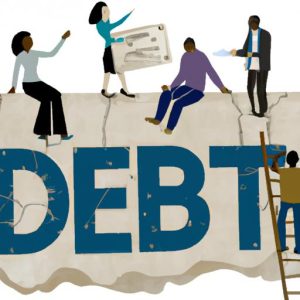In today’s fast-paced world, the ease of swiping a credit card often leads to overspending and, unfortunately, defaulting on credit card debt. But what exactly does it mean to default on your credit card debt? Essentially, defaulting occurs when you fail to make the minimum payment on your credit card for an extended period, typically 180 days or more. This can have severe repercussions on your financial well-being and overall credit health.
Understanding the consequences of defaulting on credit card debt is crucial for anyone who holds a credit card. Not only does it negatively impact your credit score, but it can also result in legal actions taken by credit card companies and aggressive debt collection efforts. By delving into the intricacies of defaulting on credit card debt, we can better equip ourselves with the knowledge needed to avoid falling into this financial pitfall.
What is Default on Credit Card Debt?
Explanation of Defaulting on Credit Card Debt
Defaulting on credit card debt occurs when an individual fails to make the minimum payment on their credit card for an extended period, typically 180 days or more. This failure to meet payment obligations can lead to serious consequences, including damage to one’s credit score and potential legal actions from credit card companies.
Common Reasons for Defaulting on Credit Card Debt
There are various factors that can contribute to individuals defaulting on their credit card debt. Some common reasons include financial hardships such as job loss, medical emergencies, overspending, and lack of financial management skills. Understanding these underlying reasons can help individuals take proactive steps to avoid defaulting on their credit card debt and regain control of their financial situation.
Consequences of Defaulting on Credit Card Debt
Impact on Credit Score
One of the most significant repercussions of defaulting on credit card debt is the detrimental impact it can have on your credit score. Your credit score is a numerical representation of your creditworthiness, and defaulting on debt can cause a significant drop in this score. A lower credit score can make it challenging to secure loans, mortgages, or even new credit cards in the future. It’s essential to prioritize timely payments to avoid damaging your credit score.
Legal Actions Taken by Credit Card Companies
When you default on credit card debt, credit card companies may take legal actions against you to recover the outstanding balance. This could involve lawsuits, wage garnishment, or even asset seizure in extreme cases. It’s crucial to understand the legal implications of defaulting on credit card debt and seek professional advice if you find yourself in this situation.
Debt Collection Process
Following default on credit card debt, you may face aggressive debt collection efforts from collection agencies hired by credit card companies. These agencies may resort to frequent phone calls, letters, or even intimidation tactics to collect the debt. Understanding your rights under the Fair Debt Collection Practices Act (FDCPA) is essential to protect yourself from harassment during the debt collection process.
How to Avoid Defaulting on Credit Card Debt
Budgeting Tips to Manage Credit Card Payments
When it comes to managing credit card payments and avoiding default, creating a budget is paramount. By outlining your monthly income and expenses, you can allocate funds towards paying off your credit card debt. Consider prioritizing high-interest credit card balances and making more than the minimum payment to reduce overall interest costs.
Importance of Making Timely Payments
Timely payments are crucial in maintaining a healthy credit history and avoiding default on credit card debt. Set up automatic payments or create reminders to ensure you never miss a payment deadline. By consistently making on-time payments, you not only prevent default but also demonstrate financial responsibility to creditors.
Seeking Help from Credit Counseling Services
If you find yourself struggling to manage your credit card debt, don’t hesitate to seek help from credit counseling services. These professionals can provide valuable insights and guidance on budgeting, debt repayment strategies, and negotiating with creditors. By proactively seeking assistance, you can take control of your financial situation and avoid the pitfalls of defaulting on credit card debt.
Steps to Take if You are Already in Default on Credit Card Debt
Communicating with Credit Card Companies
When you find yourself in default on your credit card debt, the first step is to communicate with your credit card company. Ignoring the issue will only exacerbate the situation. Reach out to your credit card issuer and explain your current financial predicament. They may be willing to work with you to create a repayment plan or offer alternative solutions to help you get back on track. Open and honest communication is key in resolving default on credit card debt.
Exploring Debt Settlement Options
If you are unable to manage your credit card debt on your own, it may be beneficial to explore debt settlement options. Debt settlement involves negotiating with your creditors to reduce the total amount you owe. This can be a viable solution for individuals facing overwhelming debt. However, it is essential to approach debt settlement cautiously and seek professional advice to ensure you are making informed decisions.
Seeking Legal Advice if Necessary
In some cases, defaulting on credit card debt may lead to legal actions being taken against you. If you are facing lawsuits or other legal repercussions due to your default, it is crucial to seek legal advice. A qualified attorney can help you navigate the legal complexities of default on credit card debt and provide guidance on the best course of action to protect your rights and financial interests. Remember, seeking legal advice early on can help mitigate potential consequences of defaulting on credit card debt.
Conclusion
In conclusion, defaulting on credit card debt is a serious financial misstep that can have long-lasting consequences on your credit health and overall financial well-being. By understanding what constitutes defaulting on credit card debt and the potential repercussions, you can take proactive steps to avoid falling into this predicament.
Remember, maintaining financial responsibility and staying on top of your credit card payments is key to avoiding default. Budgeting wisely, making timely payments, and seeking help from credit counseling services when needed are all effective strategies to steer clear of defaulting on credit card debt.
By prioritizing financial responsibility and taking control of your credit card debt, you can pave the way for a more secure financial future and avoid the pitfalls of defaulting on credit card debt. Stay informed, stay proactive, and remember that your financial well-being is in your hands.

